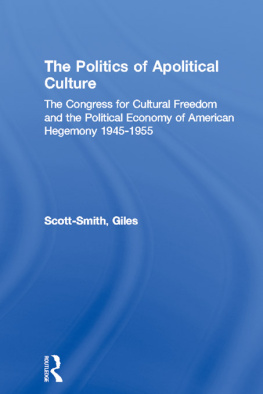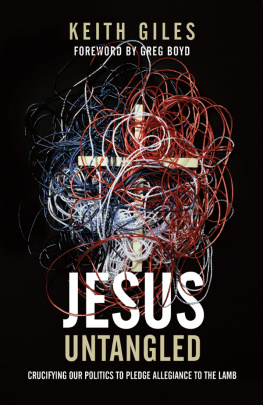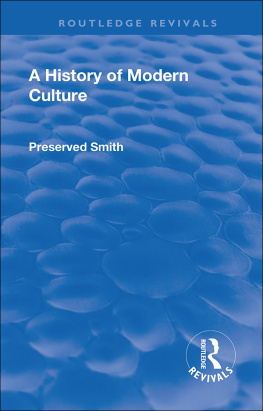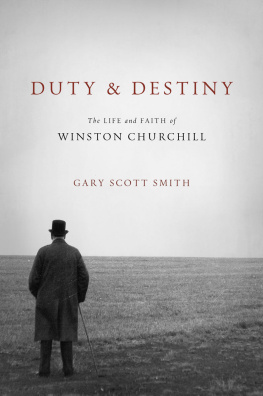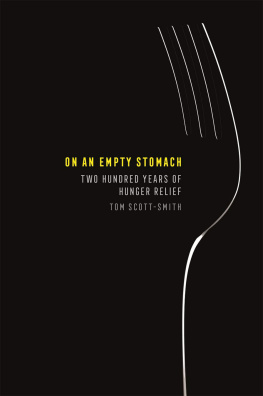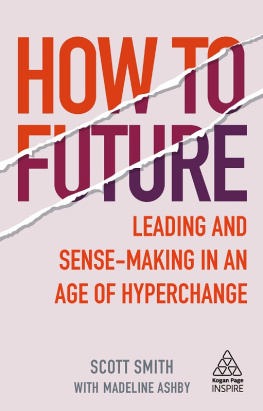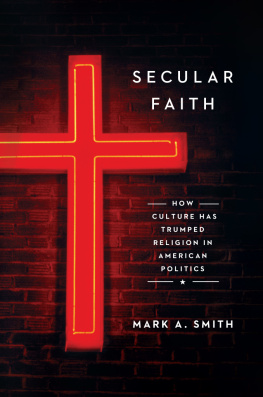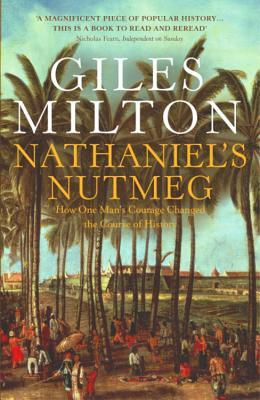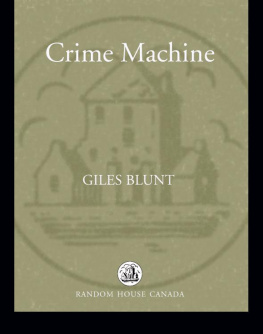Giles Scott-Smith - The Politics of Apolitical Culture
Here you can read online Giles Scott-Smith - The Politics of Apolitical Culture full text of the book (entire story) in english for free. Download pdf and epub, get meaning, cover and reviews about this ebook. publisher: Taylor and Francis, genre: Politics. Description of the work, (preface) as well as reviews are available. Best literature library LitArk.com created for fans of good reading and offers a wide selection of genres:
Romance novel
Science fiction
Adventure
Detective
Science
History
Home and family
Prose
Art
Politics
Computer
Non-fiction
Religion
Business
Children
Humor
Choose a favorite category and find really read worthwhile books. Enjoy immersion in the world of imagination, feel the emotions of the characters or learn something new for yourself, make an fascinating discovery.
- Book:The Politics of Apolitical Culture
- Author:
- Publisher:Taylor and Francis
- Genre:
- Rating:3 / 5
- Favourites:Add to favourites
- Your mark:
- 60
- 1
- 2
- 3
- 4
- 5
The Politics of Apolitical Culture: summary, description and annotation
We offer to read an annotation, description, summary or preface (depends on what the author of the book "The Politics of Apolitical Culture" wrote himself). If you haven't found the necessary information about the book — write in the comments, we will try to find it.
The Politics of Apolitical Culture — read online for free the complete book (whole text) full work
Below is the text of the book, divided by pages. System saving the place of the last page read, allows you to conveniently read the book "The Politics of Apolitical Culture" online for free, without having to search again every time where you left off. Put a bookmark, and you can go to the page where you finished reading at any time.
Font size:
Interval:
Bookmark:
First published 2002
by Routledge
11 New Fetter Lane, London EC4P 4EE
Simultaneously published in the USA and Canada
by Routledge
29 West 35th Street, New York, NY 10001
Routledge is an imprint of the Taylor & Francis Group
2002 Giles Scott-Smith
Typeset in Baskerville by Taylor & Francis Books Ltd Printed and bound in Great Britain by Biddles Ltd, Guildford and Kings Lynn
All rights reserved. No part of this book may be reprinted or reproduced or utilized in any form or by any electronic, mechanical, or other means, now known or hereafter invented, including photocopying and recording, or in any information storage or retrieval system, without permission in writing from the publishers.
British Library Cataloguing in Publication Data
A catalogue record for this book is available from the British Library
Library of Congress Cataloging in Publication Data
Scott-Smith, Giles.
The politics of apolitical culture: the Congress for Cultural Freedom, the
CIA, and post-war American hegemony / Giles Scott-Smith.
p. cm. (Routledge/PSA political studies series; 2)
Includes bibliographical references (p.) and index.
1. Congress for Cultural Freedom. 2. Anti-communist movements.
3. United States. Central Intelligence Agency. 4. United
StatesRelationsEurope. 5. EuropeRelationsUnited States. I. Title.
II. Series.
D839 .S39 2001
327.01713dc21
2001034985
ISBN 0-415-24445-5
The political economy of US hegemony 194550
The initial context for examining the formation and cultural agenda of the Congress for Cultural Freedom (CCF) is the rise to dominance of an American internationalism that, combined with a deep-seated anti-communism, set the goals for post-war US foreign policy. Above all, this policy sought to overcome the conflicting interpretations and expectations of the post-war world by promoting the solution to European socio-economic problems through free enterprise and astute democratic political management. Through the inter-locking of political, economic, and cultural-intellectual interests, their mediation via a network of social elites in the USA and Western Europe, and the promotion of their unity by means of a common ideology in favour of the general interest, the potential for hegemony emerged. This was not a simple integrated system but a set of conditions where the interests of various social elites converged and were expressed within connected realms as a kind of umbrella of interpretation. Thus a historic bloc came together whereby the political, cultural, and economic aspects of a particular social formation [are united] in historically specific ways to form a complex, politically contestable and dynamic ensemble of social relations. To achieve intellectual and moral leadership by means of consent in democratic societies, norms of intellectualcultural behaviour have to be institutionalised in such a way that they reflect natural conditions, their legitimacy not being impaired by any apparent political or economic interest. The contours of post-war American political economy, and the extension of its interests, therefore need to be sketched out.
In the context of AmericanEuropean relations, the most significant development after the Second World War was the consolidation of internationalism under the Truman presidency. Trumans predecessor, Franklin Roosevelt, had sought to ensure a post-war peace through the cooperation of the major states in the forum of the United Nations (UN) and the smooth functioning of the world economy as overseen by the Bretton Woods institutions, therefore avoiding not only any long-term commitments abroad for the USA but also the lack of international stability that was present after the First World War. It did not take long after the war for this aim to be upset.
It seems relatively clear now that the Soviet position was based upon an understanding of inevitable confrontation with the capitalist West, but that this could be contained within a post-war balance of power between the two camps. Yet this was a wish that became complicated due to the unwanted high-level involvement of the nuclear-armed USA in European affairs. What is of greater relevance is the form that American internationalism took. In his State of the Union speech of January 1948 Truman spelled it out.
We have learned that the loss of freedom in any area of the world means a loss of freedom to ourselves that the loss of independence by any nation adds directly to the insecurity of the USA and all free nations. We have learned that a healthy world economy is essential to world peace that economic distress is a disease whose evil effects spread far beyond the boundaries of the afflicted nation.
Two aspects to this statement need to be emphasised. First, the assumed universalism of a particular conception of human freedom, for which the USA has become the principal defender. The Cold War was above all an ideological struggle between opposed conceptions and trajectories of social organisation and world order. Second, the importance of improving economic conditions as a means to prevent the evil effects of communism from gaining increased support. If socio-economic prosperity could be assured, the causes of communist allegiance poverty, insecurity, unstable governance would be effectively removed. These issues had been heavily endorsed the previous year through the initiation of the Truman Doctrine and the European Recovery Program (ERP) or Marshall Plan, both of which marked 1947 as an apparent watershed in post-war US foreign policy for their open commitment to European affairs. Above all, 1947 signalled the end of Roosevelts aim for a managed international political and economic landscape based on a multilateral foundation of cooperation and consent. For instance, there is a considerable difference in outlook on the world between the United Nations Relief and Rehabilitation Administration of 19436 and the Truman Doctrine and the Marshall Plan of 1947. The anti-fascist Grand Alliance of the war years was no longer an influence on the interpretation of national policy.
Communism in particular, and totalitarianism in general, became the bte noire , the alien other, to the political, economic and cultural freedoms inherent in American life. Of course, this creation of an enemy is a fundamental aspect to the theory and practice of traditional politics. The point at which American foreign policy clearly stated the form its post-war internationalism would take can be marked as Trumans request in early 1947 for aid to Greece and Turkey. The call to arms was explicit:
At the present moment in world history nearly every nation must choose between alternative ways of life. The choice is too often not a free one. One way of life is based upon the will of the majority, and is distinguished by free institutions, representative government, free elections, guarantees of individual liberty, freedom of speech and religion, and freedom from political oppression. The second way of life is based upon the will of the majority. It relies upon terror and oppression, a controlled press and radio, fixed elections, and the suppression of personal freedoms. I believe that it must be the policy of the United States to support free peoples who are resisting attempted subjugation by armed minorities or by outside pressures. I believe that we must assist free peoples to work out their own destinies in their own way .
This was a direct response to the decline of the ability of Great Britain to maintain its influence in world affairs. The USA had to act to fill this impending power vacuum in order to prevent possible undesirable consequences. It was this interpretation of the post-war situation as one of potential more than actual threat that determined US action.
Font size:
Interval:
Bookmark:
Similar books «The Politics of Apolitical Culture»
Look at similar books to The Politics of Apolitical Culture. We have selected literature similar in name and meaning in the hope of providing readers with more options to find new, interesting, not yet read works.
Discussion, reviews of the book The Politics of Apolitical Culture and just readers' own opinions. Leave your comments, write what you think about the work, its meaning or the main characters. Specify what exactly you liked and what you didn't like, and why you think so.

